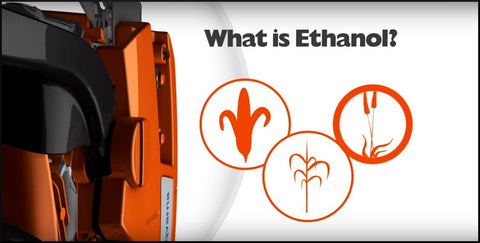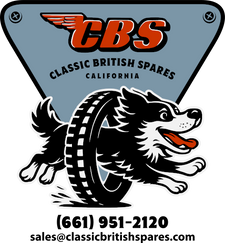
Beware: Ethanol Fuel Damaging Carburetors

Hello C.B.S. readers and enthusiasts. Today I will be discussing a topic and also sharing a story in which has to do with ethanol fuel and why it is so damaging to your carburetors. I was prompted to write this post based off of my recent personal experience. I would like to encourage everyone to read this post - It could save you a lot of time and money. Without any further delay let's get to it!
What is ethanol fuel?

According to Wikipedia "Ethanol fuel is an "eco-freindly" alternative to gasoline. It is composed from ethyl alcohol - the same type of alcohol typically found in alcohol beverages but used as fuel. It is most often used as a motor fuel, mainly as a biofuel additive for gasoline."
Here in the United States ethanol fuel is typically called E10. The ethanol content of most of the motor gasoline sold in the United Sates does not exceed 10% by volume
My recent experience
Recently I had most of my hardware re-chromed which included fenders, grab rail, gas tank, brackets, and other miscellaneous parts off of my 1969 BSA A65 Lightning.
The whole process from putting the bike on the lift, removing the hardware, and reinstalling the hardware after having it chromed was about 3 months.
During this time frame I left the fuel in the carburetors - big mistake. Upon starting the bike I noticed that it would only run for about 2 seconds then shut off. How strange.. it ran fine before.. Keep in mind that these carbs have been on my bike (running great) for about a year and a half.
It never dawned on me that the fuel could have gone bad after 3 months. Well this was the case. I removed both carbs and dissemble them for a thorough cleaning. To my surprise the insides where corroded. The inside coating was stripped down to the carburetors dull natural finish.

Float bowl of a carburetor corroded by ethanol fuel
Every component made from brass found its was to the trash. Corroded beyond use and I didn't want to risk it. I replaced all the brass hardware with new Amal parts.
After the carburetor rebuild I installed the carbs, topped the tank off with fresh gas and gave it a kick. The BSA Lightning started right up but it was too soon to be excited. Now I have another issue - carburetor #2 does not "pick-up" or respond until the air screw is literally 5 turns out!
To make the long story short I rebuilt and cleaned carburetor #2 about 5 times with no success. The corrosion was so bad to the point it internally damaged the carburetor. I used picks, carb cleaner, an ultra-sonic cleaner, air gun, and any other trick in the book to get the carbs working again as it should with no success.
I believe there was damage internally which was causing the carburetor to run extremely rich on the pilot circuit. I adjusted the float height and fuel level but that did not solve the problem.
Solution

Here is my 2cents in which I tell my customers to live by and I now follow these rules - if you want to avoid the same problems I endured then I recommend that you pay close attention to the following steps below.
#1 - Do not leave fuel in your gas tank and carburetor for more than 2 months. Drain all fuel from your carb and gas tank to avoid any possible damage.
#2 - Before you start your bike perform a smell test of your gas. If the ethanol smells "stale" or "sour" remove the fuel immediately - do not turn the fuel taps on.
#3 - Use vinegar to help fight rust. Remove fuel from tank and fill the entire tank with vinegar. This will help fight rust over long periods in storage.
#4 - Use an ethanol fuel stabilizer to prevent fuel separation. When ethanol fuel becomes "stale" it attracts water which causes corrosion. An ethanol fuel stabilizer can be found at a local auto-parts store.
Conclusion
For those who live back east where you have long winters, following the steps above is a must. Ethanol fuel can cause some serious destruction to your fuel system not to mention costing you money. If you cannot drain the fuel from your take or carbs you can always purchase a fuel stabilizer formula. As always I hope my experience and time lost will help you. Thanks for reading and feel free to comment in the section below.

Dale Meyers
Carburetors don’t like ethanol period, no matter what the corn squeeze advocates claim. We have several older Honda and Yamaha dirt bikes. All well maintained. Pilot jets continually plug up and they just wont start or run right after they sit with gas in them for even a short time. Doesn’t have the same affect on the newer fuel injected units. 2 Hinkley Triumphs and a KTM and they work fine no matter how long they sit. The only solution is removing the carburetor and thoroughly cleaning all the jets and air bleeds. I use various sizes of brass or beryllium copper wire and compressed air. The wire can be found at hobby stores or suppliers. It does not damage the jets like those little file things can do. Just did a CFR450 and the corrosion was substantial even though the carb was completely restored only a few years ago. I think we’ll have to be more religious about draining the fuel from the tank and carbs. Just put the fuel in the Chevy 4×4. Doesn’t seem to bother newer cars as the systems are stainless steel. Good to filter it though. There are folks out there that sell transfer pumps. I just made my own set up with an electric fuel pump and some Tygon tubing. At least on older British bikes the carbs can be most often easily removed and cleaned and not so many parts like a Keihin FCR. I would also caution about using vinegar to clean carb bodies. It has a pH of 2.4 making it very acid and will damage them. It actually weakens the alloy. I know. I’ve done it. There are products that clean aluminum boat hulls that work only to remove the aluminum oxide that won’t harm the base metal. There are also products for cleaning brass cartridge casings that work on floats and jets. Brass can be damaged with acid as well. The firearms people say it weakens the brass which is common speak for alloy damage that you might not even see. With carbs, cleanliness is the only rule to follow. Hope my experience helps someone.
Robert
One good alternative is to use Rec-90 non ethanol gas with a fuel stabilizer for storage . I have had fuel last for a year in my boat and truck stored in the FL keys but don’t recommend it , the covid virus caused that . some BP and Marathon stations carry Rec-90.
Inspector Bob
My 1968 Royal Star does not like ethanol fuel. If in the tank for more than a short time the idle circuit in the carburetor clogs up and it will not start. I tried closing the petcocks and running the carb dry but it did not solve the problem. I have disassembled the single carb numerous times to clear the circuit with carb cleaner and a bristle from a wire brush. That works but the solution I have is to only run non-ethanol fuel. If you are near any marinas they offer Rec-90, a non ethanol fuel. I have found only one gas station in central Ohio that has non ethanol fuel. It’s about 15 miles away but I’m happy to fill up my 5 gallon cans. I also use the non ethanol fuel in all of my yard equipment.
Problem solved.
Kevin Carr
i will be leaving my bike for 3 months. Should i fill the tank and add stabilizer or fill it with vinegar? What kind of vinegar? Thanks
Classic British Spares
@Brian – my solution was to simply replace the carbs. The ethanol fuel damaged them beyond repair.